Dr. Richard in California with his mother, during the Depression
I may get into trouble, but isn't this child the cutest thing? I feel honored that Dr. Richard Mabry allowed me to share his childhood photo with you. (He called his clothes "sissy," but he is a Dapper Diaper Richard!) But later he would trade these duds for a baseball uniform, an Air Force uniform and doctor's scrubs.
All kidding aside, I have great respect for Dr. Richard and the things he has accomplished in his life, so far--and he is far from done. His first book, The Tender Scar:Life After The Death Of A Spouse, which was released in March, 2006 by Kregel Publishers, came out of his own grief and personal experience when his wife, Cynthia, died in 1999. His lifetime of helping others came into play, even when he was most vulnerable. Writing to give others help on such a journey healed him. And he found he wanted to continue to write.
During his medical career he had over 100 medical papers published, as well as co-authored or edited eight medical textbooks. He says, "I had no idea that my writing would continue after retirement."
In 2003 he met James Scott Bell at the Glorieta Christian Writers’ Conference. Somehow he ended up in Jim’s class on writing fiction, and Dr. Richard had always been a voracious reader, sooo this was the beginning of his schooling in plot, structure, characters and all that stuff that makes up fiction.
With a background in medicine, Dr. Richard knows how to study, and his mentors and those he has taken classes from are a Who's Who in fiction. He says he also took a class in writing “edgy fiction,” taught by Alton Gansky, another writer who became a friend.
Dr. Richard says, "Like Jim Bell, Al introduced me to many of the basics of Christian fiction. He told us, 'Once you try your hand at writing, you’ll never read in the same way again.'"
Gansky was the one who introduced him to a nonfiction editor and things happened from there for his nonfiction book.
You and I both know that with God there are no coincidences. Al introduced him to Gary Terashita, who at that time was with Broadman & Holman. After determining that B&H wasn’t in the market for the type of non-fiction book the doctor had planned, they chatted about baseball, which you are going to see, is a passion since his childhood.
It's funny how everyone has their own journey into fiction, and Dr. Richard's story here is only beginning. Since Terashita is a big baseball fan, too, he said to Dr. Richard, “Why don’t you try your hand at a novel? Something combining baseball and medicine. Send me a proposal when you’re done.” This sounded like a good plan to Dr. Richard, as he has played semi-pro, coached and attended major league fantasy camps.
He is on his way, studying the craft of fiction writing, getting all the way to committee with one fiction manuscript, and blogging about writing and his journey on his blog, Random Jottings. With a nonfiction book out there, he also speaks and writes articles and devotions. But, this all happened after 2003. Before that, he had a complete career in the practice of medicine as an ear, nose and throat specialist, and also served a stint overseas in the US Air Force, several periods as an interim music minister, and an all-too-brief experience as a semi-pro baseball player!
He retired after a quarter of a century as a private practitioner and a decade as a professor at the University of Texas Southwestern Medical Center and is now married to his "fiction first reader" and lovely wife, Kay, as he now works on fiction.
If all this wasn't enough, he also has an interesting childhood/young adulthood.
Let's see how his past shaped the writer he is and is becoming:
CHILDHOOD AMBITION:
When I was old enough to think about such things, there was no doubt in my mind about what I wanted to be when I grew up. I was going to be a pilot. Not an airline pilot, though. My uncle was in the Air Force (this was during World War II) flying P-38’s in Italy. When he came home, he gave me his wings. I wore them constantly, even on my pajamas, until my mother made me give them back to him when he got married, so he could pass them on to his own children.
When I figured out that my idea of earning a living wasn’t very practical, I decided that I’d like to be a lawyer. The girl I had the biggest crush on at the time was the daughter of our District Attorney, she said she was going to be a lawyer, and I had it all figured out that we’d get married and practice together. I knew I was good at speaking—later won State in Extemporaneous Speech as a senior in high school—so it was a lock.
Dr. Richard practicing his public speaking. He was State champ in Extemporaneous Speech
About my junior year in High School, I began to think seriously about what I wanted to do. I even took a series of aptitude tests offered at a nearby college. That’s when I first considered medicine. By my senior year, I felt a definite “call” into medicine. Sounds corny, but God impressed me that my future lay in that direction. He was right (as usual).
FONDEST CHILDHOOD MEMORY:
My dad worked hard to support us. He passed on his love of baseball to me, and I played the sport for four years in high school. I was a pitcher, and the only way you can practice that discipline is with someone who’s willing to catch you. Most days my dad would come home, worn out (I now realize), and without being cajoled he’d pick up the catcher’s mitt, take his place behind the cardboard home plate I’d fashioned, and play catch with me until it was too dark to see.
High School Baseball Team
(He's in the front row, second from the right end)
PROUDEST MOMENT GROWING UP:
I was so proud to walk across the stage of Decatur High School and accept my diploma, then address my fellow students, the faculty, and the gathering of parents and relatives as Valedictorian of that class. My mother and father were there, and it was wonderful to show them that their support had meant so much to me and for them to see what I had achieved.
BIGGEST CHALLENGE AS A TEEN:
Looking back, my challenge, frankly, was feeling as though I belonged. Oh, I played a sport, participated in a number of extracurricular activities, sang in the glee club. But I didn’t get into trouble, flaunt authority, run with the “beautiful people," hang with the popular crowd. It wasn’t that I didn’t have friends, but I never felt that I “fit in.” I guess it left me basically introverted, although I can put on the extrovert mask when I need to.
MY FIRST JOB:
I was hired as a salesman for a small record shop in a space that a local businessman leased in the back of my dad’s furniture store. I doubt seriously if he made any money at it. Record sales in Decatur, Texas, weren’t a big thing back then. I do recall that my salary wasn’t much but I got to listen to records all afternoon.
As soon as I started college, I began working in the chemistry department, first as an attendant in the stockroom (issuing and stocking chemicals and equipment). After a year I’d been promoted to lab assistant and continued to work in the department until I left for med school.
CHILDHOOD INDULGENCE:
Down the block from my dad’s furniture store was a drugstore that sold warm nuts. After school, I’d beg my mother for a quarter so I could run down to the Rexall and get a quarter pound of warm cashews. They’d be gone by the time I got back to our store.
FAVORITE ACTIVITY:
Baseball was more than a sport. It was something at which I was pretty good. When I was with the team, I felt as though I belonged. I even pitched a two-hitter my senior year. (My college didn’t have a baseball team, but I played some semipro ball while I was in pre-med).
My dad was a baseball fan. He loved the Brooklyn Dodgers, so (in the perverse way teenagers have) I rooted for the St. Louis Cardinals, the Dodgers’ rivals. I can still recall some of the names from those teams of the forties and fifties. I still love baseball, and it pleases me that both my sons played the sport and I was able to coach them.
FAVORITE CHILDHOOD MOVIE:
Whatever western was playing at the Ritz on the corner of the square on Saturday. I watched all the stars: Lash LaRue, Hopalong Cassidy, Johny Mack Brown. “Big Boy” Williams was from Decatur, so he was our local hero. My tastes were eclectic, so long as there was a western theme, without too much music or “mushy stuff.”
FAVORITE CHILDHOOD BOOK:
I think the book that first captured my imagination was Treasure Island. I probably read it three or four times.
CHILDHOOD HEROES:
There were a succession of these. My uncle was my hero while he was flying in the war. The movie stars of the Saturday matinees came next. Then the baseball stars like Marty Marion, Red Schoendienst, Enos Slaughter. Finally, when I had enough maturity to realize what they’d done for me, my parents.
APPLICATION TO MY LIFE:
How did my childhood shape my life? I learned to be independent, not follow the crowd or worry if they didn’t approve. I developed a love of sports that persists to this day and makes me weep when I see professional athletes who don’t take their status as role models seriously. I learned to appreciate the importance of family. And I learned to empathize and sympathize with others who are going through tough times. I believe that’s why The Tender Scar has had such a ministry—I was able to put into words the feelings that thousands of people, hurting from the loss of a loved one, had experienced, combining them with words of hope drawn from my own experience.
If you know someone or you have lost a spouse to death, do get this book. Also, be sure to check his blog, Random Jottings.

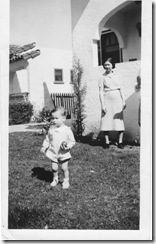
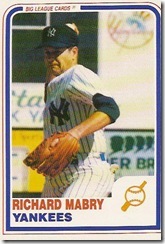
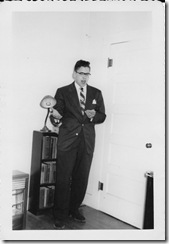
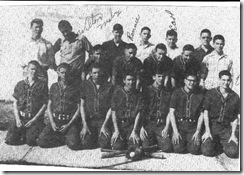
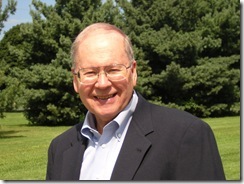
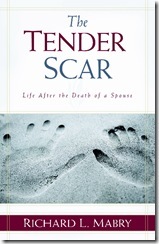
1 comment:
Crystal,
Thanks for the opportunity to share a bit of my past. I appreciate it.
Happy Thanksgiving to you and to all your readers.
Richard
Post a Comment